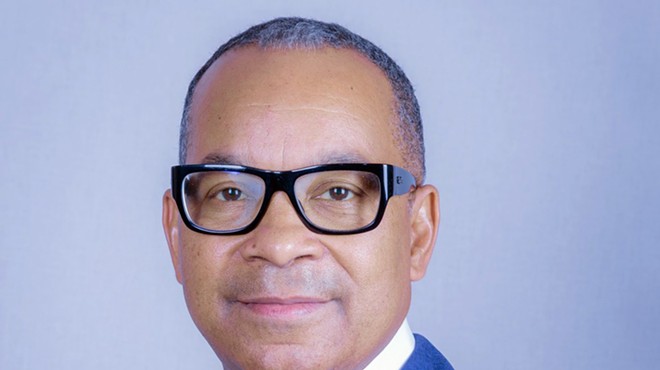They say the stories about Goines exploding in anger at Jazz St. Louis’ Young Friends Board — and other incidents that had some local staff members and volunteers alarmed — echoed their experiences.
His former Northwestern students say Goines alternated between being absent and micromanaging, often subjecting students to angry outbursts. A Juilliard graduate reports a hostile environment where another instructor would warn her away when Goines was in a foul mood.
Goines, 61, is an accomplished musician who has played with Wynton Marsalis since childhood. He served as artistic director of Juilliard Jazz, which he’d helped found, from 2000 to 2007 and as the director of jazz studies at Northwestern University from 2007 until last July.
In both cases, Goines’ former students report that his departure followed groups of students reporting concerns about his behavior to administrators.
“When you meet him, initially, he's always very cordial, very nice, very personable, approachable, but the minute you get in deep with him in terms of in a professional setting for a long term or an education setting with students, that's when things turn really, really negative,” says Erica von Kleist, a Juilliard graduate who has played at the Jazz at Lincoln Center Orchestra and is an instructor at the Manhattan School of Music.
When asked to comment on allegations about Goines’ tenure, Northwestern Director of Media Relations Hilary Hurd Anyaso said via email on May 3, “[W]e do not comment on personnel matters.” In April, Juilliard Director of Communications Allegra Thoresen directed the RFT to an article detailing Goines’ plans to focus on his music. Thoresen indicated today that the school did not have further comment.
In response to a detailed list of questions, Jazz St. Louis Board Chair Bill Higley issued a statement in support of Goines, writing: “As part of the search process that led us to hire Victor, the Board sought input from colleagues who know him well, including during his time as a tenured professor at Northwestern. We received overwhelmingly positive reports demonstrating not just Victor’s qualifications but his commitment to our values of diversity and inclusion.”
The arts are rife with cliches of tough and sometimes harsh directors and teachers who turn out peerless musicians. Goines — and many of his supporters — seemed to place himself in that category.
“I would talk to some people about his behavior, and they would just be like, ‘Oh, yeah, that's just the way he does things.’ And certainly some of the older generation of players were like, ‘Yeah, but, you know, he gets results, and that's the way that he's decided to do things,” says Mikey Ahearn, a second-year graduate student at Northwestern. “He had this whole joke about, ‘This is why the boss has to be an asshole.’”
Higley has a similar idea, writing in a statement that Goines has a “more direct leadership style” that will “necessitate a period of adjustment.”
But did Goines’ behavior get results? Five of his former students say no, and Northwestern teacher evaluations shared with the RFT seem to back them up.
The problems with the Northwestern jazz program began with Goines’ absences. His students report he spent a significant amount of time away on tour, which caused logistical problems — even as he insisted on having all decision-making power.
“He was away for most of rehearsals,” a former student says. “He would try to micromanage the logistics of everything via email or phone, and it just wasn't really working.”
Von Kleist says that pattern dates back to Juilliard. “Not only was he not overseeing the functionality of the program because he was there intermittently, when he was there, if there was any confusion or anything wasn't going right, he would be angry at the students,” she says. “He'd be angry at us, and he would let us know how awful we were.”
Goines would sometimes fall asleep in rehearsal after returning from touring, which could lead to tension. One student says Goines had “outbursts” from time to time, especially when “overworked and sleep deprived” but that “as long as he felt like he was on the moral high ground, then it was OK.”
“I've had lessons where he's falling asleep because he is tired from touring,” a different student says. “Then I've had lessons where I just never had a shot of it being a good lesson because he was pissed off going into it.”
Northwestern teaching evaluations shared with the RFT show similar sentiments. “[P]rof Goines is rarely present - when he is, he's in a flurry trying to fix and adjust things, only to disappear again as quickly as he came,” one wrote after the spring 2022 semester. Another wrote that Goines “was absent the majority of the quarter and would sometimes doze off or leave unexplainedly [sic] when he was present.”
Goines’ Northwestern students also take issue with the jazz program he designed. They say the curriculum was not differentiated enough from the classical music program and did not include a jazz theory sequence. (Northwestern did not respond to an email last week asking for comment on those complaints.)
Students were also frustrated by the hurry-up-and-wait push-pull caused by his absences.
“We didn't know what we were playing until like two weeks before the show,” one student says. “We’d have three rehearsals a week that, at that time, were not managed well because Goines was absent. And we were just sitting there kind of twiddling our thumbs playing different songs until eventually we had like crunch time, and all of a sudden he decided our setlist and then he got angry at us for not knowing the music.”
The teacher evaluations, which are public to everyone at Northwestern, reflect these statements. Students from the winter 2021 semester said, “This quarter was — in general — a failure.” “NUJO made jazz not fun for me.” “[T]ough environment in rehearsals.”
From spring 2021: “poor directorial management,” “Consistently disorganized. We are treated by Mr. Goines like children and are frequently made examples of and talked down to in a demeaning and unhelpful manner.” “Woefully underwhelmed by jazz orchestra.” “Everything that went wrong with the winter quarter has happened again.”
The trend continued in spring 2022, though there are fewer overall: “Oh man, what to say that hasn't already been said. I think we should take a second look at how we are handling this class's instruction. Structure is lacking.”
What’s the difference between talk that’s tough and abusive?
Von Kleist says that Goines was "punitive in his demeanor" toward students at Juilliard, that he’d open rehearsals by saying things like, “You are the most disrespectful students I've ever had.” She continues, “He would say things like, ‘You were the most ungrateful, immature people, young people I've ever worked with.’” Even so, she says he was angry but calm, and she only witnessed him raising his voice a few times.
It was different at Northwestern. The students there say Goines semi-regularly yelled at them in rehearsal or over the phone and that he’d make threats in the heat of the moment.
“He would bully us; he was incredibly emotionally abusive to a lot of us and would throw a tantrum when he'd been away on tour for three, four months and then came back and couldn't micromanage everything,” Ahearn says. “He’d get into shouting matches with us for no apparent reason other than to just assert some kind of dominance.”
An undergraduate said Goines would use the Socratic method with his students and then get frustrated if they didn’t furnish the correct answer, describing how Goines’ temper would flare, and he’d raise his voice. “It would just kind of be sudden and unexpected.”
The student describes an incident in rehearsal, saying Goines liked to close the door and have what he called a “come to Jesus” moment. Once, when displeased with a recent concert performance, Goines told the students that they weren’t motivated and not practicing enough. The student made a suggestion about submitting videos of practice and Goines said that was too strict and boxed in, going so far as to compare it to slavery.
“I was like, ‘Whoa,’” the jazz student recalls, saying that they replied that Goines’ statement was an over-exaggeration and a fallacy. “Then [Goines] said, ‘You don't have to contribute to the conversation.’”
During the discussion, the student says Goines raised his voice and laughed in the student’s face. “It was demeaning,” the jazz student says. “... He got extremely defensive, like, ‘What are you saying? I'm part of the problem?’”
A third student describes how Goines went up to a student in rehearsal and started “aggressively clapping in his face,” and told the room, “If you guys don’t play well, ‘I’ll be Whiplash’” — referencing the 2014 movie about an abusive music instructor.
“It’s just an absurd comment to make for anybody to model any of their teaching off of that movie,” the student says, noting that Goines was never physical with them.
Goines’ temper, Ahearn says, often came up when someone questioned him. “He would start off speaking kind of naturally. And then you'd suggest an alternative or maybe question a bit further. And he'd go nuts.”
Von Kleist says that Goines’ temper was so known that her private instructor, the late Joe Temperley, would warn her if Goines was in a bad mood. “He would call me and say, ‘Hey, you might want to avoid Victor because he’s just on a rampage,’” she says.
Ahearn, who is non-binary and had used a move from London to Chicago to study jazz and “live a little more authentically,” says initially Goines was supportive and OK with them wearing dresses during performances. Yet, “the more I spoke to him about it,” the more Goines seemed to misgender Ahearn.
When Ahearn brought up these issues with Goines, Goines asked if Ahearn had considered it might be difficult for others.
“And had I considered that maybe, you know, I don't have to wake up every morning and pick up a gun and fight in Ukraine?’” Ahearn recalls. “I said, ‘Well, I do have to risk my life because every time I walk out the door, I might not come back. The only choice I'm making here is whether to live authentically or not.”
Several students who spoke with the RFT about Goines had either considered dropping out of the program or actually had.
“I think the environment was such that people found it easier to quit and not say anything rather than face any potential repercussion,” Ahearn says.
Two of the undergrad students who spoke with the RFT left the jazz program. One dropped the major but picked it up again after hearing Goines was gone.
“I thought about coming back,” a third student says. “This is something quite sad — or was quite sad to me and now I'm OK with — I think my interest in pursuing music professionally is gone. I don't know if I can fully say that Goines took it out of me.”
Von Kleist says that she cried in the bathroom after rehearsal almost daily and that she couldn’t listen to a jazz record for five years after graduating. “They were so soured for me, they gave me such a pit in my stomach because I associated school with them,” she says. “... He really nearly killed my love of this music.”
About a year after she graduated in 2004, Von Kleist says she declined to take part in a group of jazz students who’d gone to make a formal complaint about Goines to then-President Joseph W. Polisi because she was “so traumatized that I can’t even be in that building.” But she is sure the meeting happened.
Reached by phone on Tuesday, Polisi said that he couldn’t recall the incident and that he can’t comment on it.
Ahearn says that it was difficult to say anything about Goines because he is a famous, well-connected musician and because he’d alternate between generosity and verbal abuse.
“No one would believe us,” Ahearn says. “Like we'd go out maybe after a concert, and he would treat all his friends to this wonderful meal, and they would think he was so friendly. And so wonderful.”
Then, in another moment, he’d lose his temper at the students.
“[Goines] threatened people with not not having a future in the program because of not knowing one simple thing or you'd get phone calls about how you were really fucking up and then a phone call later, asking you how your life was going and him telling you to just treat him as another guy when he just kind of ruined your entire self esteem,” Ahearn says.
Ahearn never reported Goines’ behavior to Northwestern. But the other three students say that they did and that a group of other students did as well.
“[The assistant dean’s] response was always, ‘Yeah, we've heard this before,’” one student says.
How Goines came to leave Northwestern and how he ended up at Jazz St. Louis is not clear.
In an interview with the RFT last August, Goines said that he’d retired from Northwestern because “it's a good time to hand the football off to somebody else.” At that time, Goines said he was aware of the opening at Jazz St. Louis but that he didn’t apply for it immediately.
“However, in the past month or two, some information was coming to me that made me reconsider and look at it through a different lens,” Goines told the RFT.
Ahearn says that they and others didn’t hear about Goines’ departure at the end of the semester. Instead, in a letter dated August 25, Dean Toni-Marie Montgomery announced that Goines had left and that an interim director had been appointed.
“I am writing to share the news that Professor Victor Goines has resigned, effective July 31, from his positions as a member of the faculty in the Bienen School of Music and as Director of the Jazz Studies Program. We are grateful to Professor Goines for his contributions during his 14-year tenure in the Bienen School of Music,” Montgomery writes.
Then the Northwestern students saw that Goines had landed at Jazz St. Louis — and, as weeks turned to months, read that some jazz supporters here were having similar experiences.
“It was interesting seeing the parallels,” one Northwestern student notes, later saying, “I just wanted to make aware that this is a pattern about Mr. Goines.”
This story has been updated.
Email the author at [email protected] Subscribe to Riverfront Times newsletters.
Follow us: Google News | NewsBreak | Reddit | Instagram | Facebook | Twitter









